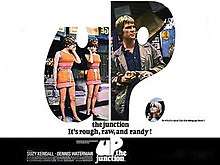Up the Junction (film)
Up the Junction is a 1968 British colour film, directed by Peter Collinson and starring Dennis Waterman, Suzy Kendall, Adrienne Posta, Maureen Lipman and Liz Fraser.[1] It is based on the 1963 book of the same name by Nell Dunn and was adapted by Roger Smith.[2][3] The film's soundtrack was by Manfred Mann.[4] The film followed Ken Loach's BBC TV adaptation of 1965, but returned to the original book.[5] It generated less controversy and impact than the Loach version.[6]
| Up the Junction | |
|---|---|
 Original British 1968 quad film poster | |
| Directed by | Peter Collinson |
| Produced by | John Brabourne Anthony Havelock-Allan |
| Screenplay by | Roger Smith |
| Based on | Up the Junction by Nell Dunn |
| Starring | Dennis Waterman Suzy Kendall Adrienne Posta Maureen Lipman Liz Fraser |
| Music by | Mike Hugg Manfred Mann |
Production company | BHE Films Crasto |
| Distributed by | Paramount Film Service (UK) |
Release date |
|
Running time | 119 minutes |
| Country | United Kingdom |
| Language | English |
Plot summary
The film begins with a Rolls-Royce leaving a large house... it then moves to a train crossing the Thames and passing Battersea Power Station.
Wealthy young heiress Polly Dean (Suzy Kendall) gives up a privileged life in Chelsea and moves to a working-class community in Battersea, where she takes a job in Macrindles confectionery factory in an attempt to distance herself from her moneyed upbringing and make her own living. On the factory floor everyone is singing and all are friendly, but perhaps somewhat unhygienic - smoking as they work on the sweets. The other girls mainly discuss men and sex.
She is asked to join the others in the pub, The Pavilion. They get the local boys to buy them drinks. She declines a lift home on a motorbike. Some are heading "up the junction". Polly walks home.
The next day Polly arrives at Clapham Junction railway station with a suitcase. She is finding a flat of her own. The agent thinks the flat is not good enough for her. She takes it anyway. She goes to the local market and buys a single banana, and eats it on a chair outside a junk shop.
The assistant Pete (Dennis Waterman) tells her it is not a cafe but when the owner (Alfie Bass) comes out she says she needs furniture so he becomes more friendly. She buys an armchair and a sofa... and also finds a kitten. Pete gives her a lift back to her flat and unloads the furniture. He asks her on a date. He presumes she wants to go to the West End but she says she wants to walk around the streets of Battersea.
She becomes friends with two working-class sisters, Sylvie (Maureen Lipman) and Rube (Adrienne Posta). Rube becomes pregnant and has a traumatic illegal abortion. Tragedy then strikes when Rube's boyfriend Terry (Michael Gothard) is killed in a motorcycle accident.
Meanwhile, Polly begins a relationship with Pete, who envies Polly's access to an easy life, and is frustrated by her rejection of a wealthy lifestyle. Pete and Polly's relationship ends in turmoil when Pete, after stealing an E-type Jaguar in an attempt to woo Polly with a night away in a hotel in Brighton, is caught and sentenced to a prison term.
Main cast
- Suzy Kendall as Polly
- Dennis Waterman as Pete
- Maureen Lipman as Sylvie
- Adrienne Posta as Rube
- Liz Fraser as Mrs. McCarthy
- Linda Cole as Pauline
- Doreen Herrington as Rita
- Jessie Robins as Lil
- Barbara Archer as May
- Ruby Head as Edith
- Susan George as Joyce
- Sandra Williams as Sheilah
- Michael Robbins as Figgins
- Michael Gothard as Terry
- Billy Murray as Ray
- Michael Standing as John
- Alfie Bass as Charlie
- Aubrey Morris as Creely
- Hylda Baker as Winnie
- Shaun Curry as Ted
- Olwen Griffiths as Fat Lil
- Queenie Watts as Mrs. Hardy
- Lockwood West as Magistrate
- Michael Barrington as Barrister
- Yvonne Manners as Hotel Receptionist
- Harry Hutchinson as Hotel Porter
- Larry Martyn as Barrow Boy
- Derek Ware as Ted's Friend
- Mike Reid as Policeman outside courtroom (uncredited)
Critical reception
In The New York Times, Renata Adler wrote of "the latest in the series of British working-class color films that seem to come from British directors with the regularity of episodes from "Our Gal Sunday," and it is by far the best of them. A lot of things are wrong with it, but a lot is going for it, too." Of the performances, she singled out the "very talented" Suzy Kendall in a challenging role, "a really beautiful piece of characterization by Dennis Waterman," and "strong" support from Adrienne Posta, Maureen Lipman and Michael Gothard. Peter Collinson's direction was also noted for his "well-shot scenes of Battersea and of the candy factory."[3]
References
- "Up the Junction (1968)". BFI.
- "Paperback review: Up the Junction, By Neil Dunn". The Independent. 31 August 2013.
- Adler, Renata (14 March 1968). "Screen: Suzy Kendall Seeks the Sweet Life in a Candy Factory:' Up the Junction' Treats Blue-Collar Britain New Movies Paired at Neighborhood Houses" – via NYTimes.com.
- "Manfred Mann - Up The Junction (Original Soundtrack Recording From The Paramount Picture)". Discogs.
- "BFI Screenonline: Up the Junction (1965)". www.screenonline.org.uk.
- https://www.irishnews.com/arts/2020/06/05/news/cult-movie-up-the-junction-remains-a-glorious-and-vibrant-snapshot-of-an-era-lost-forever-1959352/